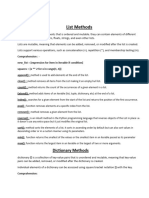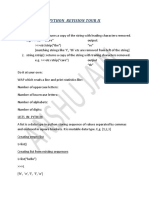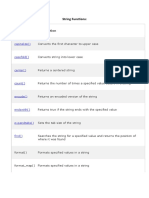0 ratings0% found this document useful (0 votes)
15 viewsBuilt in Functions and methods in Python
The document outlines built-in functions and methods for strings, lists, and dictionaries in Python. It provides a comprehensive list of functionalities for each data type, including string manipulation methods like 'str()', 'count()', and 'replace()', as well as list methods such as 'append()', 'sort()', and dictionary methods like 'get()' and 'keys()'. This serves as a reference for Python programming, detailing how to manipulate these common data structures.
Uploaded by
islamabdelkader03Copyright
© © All Rights Reserved
We take content rights seriously. If you suspect this is your content, claim it here.
Available Formats
Download as PDF, TXT or read online on Scribd
0 ratings0% found this document useful (0 votes)
15 viewsBuilt in Functions and methods in Python
The document outlines built-in functions and methods for strings, lists, and dictionaries in Python. It provides a comprehensive list of functionalities for each data type, including string manipulation methods like 'str()', 'count()', and 'replace()', as well as list methods such as 'append()', 'sort()', and dictionary methods like 'get()' and 'keys()'. This serves as a reference for Python programming, detailing how to manipulate these common data structures.
Uploaded by
islamabdelkader03Copyright
© © All Rights Reserved
We take content rights seriously. If you suspect this is your content, claim it here.
Available Formats
Download as PDF, TXT or read online on Scribd
You are on page 1/ 3
Built in Functions and methods in Python
Strings Methods :
Function Format Functionality
str(string) Converts an object into a string
Converts the first letter of each word to uppercase
string.title() and the rest to lowercase
( title format )
string.count(Sub_string) Returns the number of occurrences of a substring
in the string
string.split(delimiter) Splits the string into a list based on a delimiter
(default is whitespace)
string.lower() Converts all characters to lowercase
string.upper() Converts all characters to uppercase
string.strip() Removes leading and trailing whitespace
string.replace(Str1 , Str2) Replaces a substring with another substring
string.find(Sub_string) Returns the index of the first occurrence of a
substring. Returns -1 if not found
string.startswith(prefix) Checks if the string starts with the specified prefix
Returns True if the string starts with the prefix,
otherwise False
string.endswith(suffix) Checks if the string ends with the specified suffix
Returns True if the string starts with the prefix,
otherwise False
string.isdigit() Checks if all characters in the string are digits
Returns True if the string contains only digits,
otherwise False
Lists Methods :
list.append(elem) Adds an element to the end of the list
list.insert( position , elem) Inserts an element at a specified index
list.remove(elem) Removes the first occurrence of a specified
element
list.pop(elem) Removes and returns the element at the specified
index (default is last element)
list.index(elem) Returns the index of the first occurrence of a
specified element
list.sort() Sorts the list in place (modifies the original list)
list.reverse() Reverses the elements of the list in place
len(list) Returns the length (number of elements) of the
list
sum(list) Returns the sum of all elements in the list
(if they are numeric)
Dictionary Methods :
dict.get(key) Returns the value for the specified key, or a
default value if the key doesn't exist
dict.keys() Returns a view object displaying a list of all keys in
the dictionary
dict.values() Returns a view object displaying a list of all values
in the dictionary
dict.items() Returns a view object displaying a list of
key-value pairs in the dictionary
del dict [key] Removes a key-value pair from the dictionary
You might also like
- Iron Kingdoms 5e - Science - of - Destruction100% (3)Iron Kingdoms 5e - Science - of - Destruction9 pages
- Chapter 3 String, List, Tuple & Dictionary FunctionsNo ratings yetChapter 3 String, List, Tuple & Dictionary Functions31 pages
- Built-In Data Types: Setting The Data TypeNo ratings yetBuilt-In Data Types: Setting The Data Type8 pages
- Python Functions by Nandita Sharma XII-CNo ratings yetPython Functions by Nandita Sharma XII-C7 pages
- Compound Datatype Operators and FunctionsNo ratings yetCompound Datatype Operators and Functions7 pages
- Bulit in Functions Seprated According to Data TypeNo ratings yetBulit in Functions Seprated According to Data Type1 page
- Datatypes: Department of Mechanical EngineeringNo ratings yetDatatypes: Department of Mechanical Engineering18 pages
- Chapter 2 Python Revision Tour Ii NotesNo ratings yetChapter 2 Python Revision Tour Ii Notes36 pages
- Data Analysis With Python, String, List, Tuples, DictionaryNo ratings yetData Analysis With Python, String, List, Tuples, Dictionary12 pages
- 11computer Science-List, Tuple and Dictionaries-NotesNo ratings yet11computer Science-List, Tuple and Dictionaries-Notes13 pages
- List, Tuple, String, Dictionary FunctionsNo ratings yetList, Tuple, String, Dictionary Functions22 pages
- More With Strings, Lists, and DictionariesNo ratings yetMore With Strings, Lists, and Dictionaries5 pages
- Python_List_Tuple_Function_String_Methods (1)No ratings yetPython_List_Tuple_Function_String_Methods (1)7 pages
- Material Selection and Design For Sustainable Product100% (1)Material Selection and Design For Sustainable Product14 pages
- A New Strategic Marketing Management Model For The Specificities of E-Commerce in The Supply ChainNo ratings yetA New Strategic Marketing Management Model For The Specificities of E-Commerce in The Supply Chain14 pages
- Flight Information 9I7JSW: Confirmation NumberNo ratings yetFlight Information 9I7JSW: Confirmation Number4 pages
- Role of Pharmacist in Evidencebased Medicine PDFNo ratings yetRole of Pharmacist in Evidencebased Medicine PDF7 pages
- A Comparison of Fake News Detecting and Fact-Checking AI Based SolutionsNo ratings yetA Comparison of Fake News Detecting and Fact-Checking AI Based Solutions19 pages
- Zhalyan Sardar Ali - Transferring BenchmarckNo ratings yetZhalyan Sardar Ali - Transferring Benchmarck6 pages
- A Survey On Traffic Management in Smart CitiesNo ratings yetA Survey On Traffic Management in Smart Cities4 pages

























































































